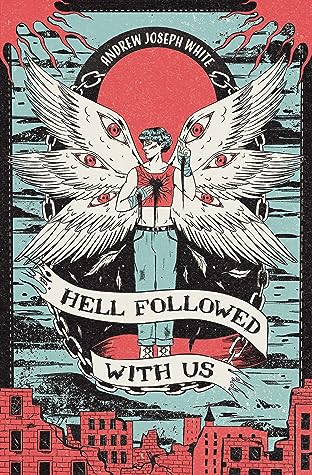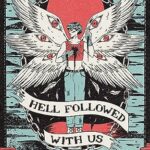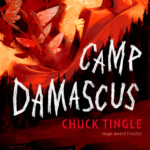Yes, this is the second novel I’ve read this week about a murderous Christian cult trying to kill a queer teenager, and what about it?
I picked up Hell Followed With Us by Andrew Joseph White after reading Camp Damascus (read my review of that here) and wanting more. A kind librarian helped me out telling me the two books were very similar, and she was mostly right. The two books have almost identical themes, both being horror YA coming of age stories about queer youths breaking away from the harmful communities they were raised in and finding their own identities and families while also fighting monsters along the way. While reading Camp Damascus felt like watching a breakneck speed action movie, though, Hell Followed With Us was a slow, heavy HBO drama.
Our main character, Benji, grew up in a doomsday cult that believes the only way to save the Earth from climate change is to stop humans from causing pollution and the only way to stop humans from causing pollution is to kill them all. They do so by creating a virus called “the Flood” that causes people’s insides to become their outsides, to put it mildly. The cult has already mostly succeeded at the start of our story, having wiped out nine billion people. But that’s not enough for them, so they create a new strain of the virus to inject in Benji that makes him able to control the Flood with his mind and kill people quicker. But this is obviously insane, so the story’s first sentence begins in the middle of a chase scene while Benji is escaping. Once out, he finds the ALC – a group of survivors built from the ruins of an LGBTQ+ resource center. There, he makes friends, learns about the world outside the cult, and starts transforming into a biblically accurate monster thanks to the Flood.
The best part of Hell Followed With Us is Andrew Joseph White’s beautiful writing in relation to Christianity. White writes in a way that is clearly inspired by the Bible and religious scripture, using flowery language that doesn’t feel forced – just simply what is necessary to convey the horrors beyond human comprehension that the characters are experiencing. It makes the terror that much more terrifying and the respite that much more sweet. White paints beautiful pictures of religious imagery that will send a shiver down your spine, making stained glass seem menacing and the word “angel” take on a new meaning.
“Hell has followed us onto Earth, and I am the monster that has brought it forth. ‘See?’ Theo puts a hand on my stomach. ‘You’re beautiful.’”
– Hell Followed With Us by Joseph Andrew White (2022)
Hell Followed With Us is post-apocalyptic. Nature has been killed by global warming and the world’s population is less than a billion. Body horrors are described that will make you squirm. Yet despite all that darkness, this is a hopeful story. It’s about rebuilding community after tragedy. It’s about children that were forced to grow up too soon coming of age. It’s about going through hell and making it out the other side having been forever changed but still alive and okay.
“There’s some kind of awful, enduring myth: that after the end of the world, people will turn on one another. That people will become hateful and selfish. That’s just not true. It’s never been true.”
– Hell Followed With Us by Joseph Andrew White (2022)
The worst part of Hell Followed With Us, and please hear me out here before you get the pitchforks out and remember I’m a part of the LGBTQ+ community, is the ALC constantly talking about their queerness. Queer representation is fantastic, and I found it refreshing to see so much of it in this novel. I am in no way saying it needs to be removed or toned down, just that the way it was inserted could probably be done more thoughtfully. The way White went about writing it felt like watching “The Last Of Us” and suddenly having Elmo cut in to tell us this episode was brought to you by the letter A. It was cool to read about characters using neopronouns, we don’t need to stop in the middle of a battle of quite literally biblical proportions to explain the history of them. Having a main character be openly trans and talking about the struggles he faces every day because of it is fantastic. Do we need to hear about the transmedicalist debate while said trans man is turning into a beast with six wings and a snout before our eyes? I feel that it is important to have discussions about queerness, to be open about it and not be ignored, but it is also important to recognize the genre you are writing in. When you are fighting every day to survive in a wasteland filled with monsters, you’re running low on supplies and wont make it through the season, and are being hunted for sport by a murder cult, is the question at the top of everyone’s mind really going to be if trans men that don’t wear binders are still men? Compare this with something else talked about constantly in this book: one of the leaders of the ALC, Nick, has autism. He often misses social cues, doesn’t like being touched, keeps beads on hand to stim with, and goes nonverbal when he’s stressed. This is important because a large group of people rely on him, and these individual things effect their day to day lives. While being queer also effects every day life, constant community in-fighting about if you’re the right kind of trans probably shouldn’t be a priority in the apocalypse. That said, these characters are mostly teenagers and I remember being a queer teenager with a Tumblr account, so maybe it’s not too far fetched to be fighting about this kind of thing at inappropriate times and this whole paragraph is moot.
Overall, I loved this book. It’s unlike anything I’ve read in a long time, and I cannot wait to read more from this author. I wish this book existed when I was a teenager because I think I would have liked it more then, but that doesn’t diminish how much I enjoyed it in my 20s and how glad I am it is here now.
Fun: 4/5
Quality: 3/5



